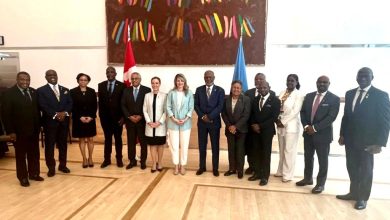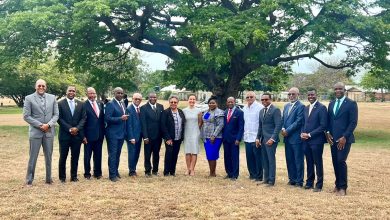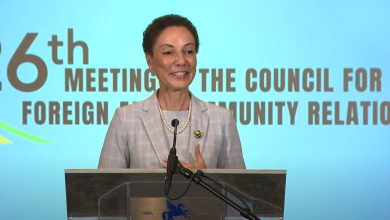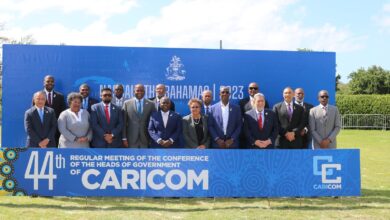(CARICOM Secretariat, Turkeyen, Greater Georgetown, Guyana) Let me start by welcoming you all here today to this the Fifteenth Meeting of the COFCOR, in the pleasant surroundings of Paramaribo. As usual, the host country has left no stone unturned to put excellent arrangements in place to facilitate the conduct of our business. For this we are grateful to the Government and people of Suriname.
Allow me to acknowledge the presence of Hon. Alva Romanus Baptiste, Minister of External Affairs, International Trade and Civil Aviation of Saint Lucia and Hon. Arnaldo Brown, Minister of State in the Ministry of Foreign Affairs and Foreign Trade of Jamaica, who are attending their first COFCOR meeting. Welcome to you both.
This Fifteenth Meeting of the COFCOR has been convened against a backdrop of global, hemispheric and regional trends, developments and transformative changes of significant relevance to the conduct of the Community’s foreign policy and to its contribution to the development and welfare of the Community. Suffice it to say that “Change” is the order of the day. The Community must therefore analyse and understand its underlying features, seek to influence it or adapt accordingly, or be left behind.
CARICOM Heads of Government have recognised the pervasive reality of change that is sweeping across our Region, shaping our trade and economic policies, our human and social development agenda, our regional security initiatives and our resource mobilisation efforts. This inevitably impacts the coordination of our foreign policy.
Coordination of foreign policy is essential to address issues such as the continued impact of the global economic and financial crisis on the economies of the Community and the attendant outreach efforts to sensitize the members of the G-20 and other international decision-making bodies to our concerns and needs. Coordination is also vital when addressing the issues affecting small island developing and low-lying coastal states in the continuing international negotiations on climate change and on sustainable development, given the upcoming Rio+20 Conference in June.
This co-ordination is also critical when engaging with external partners in the context of the Community’s strategic priorities and when dealing with concerns over emerging trends in the provision of technical assistance and cooperation, by the Community’s international development partners. In this regard, the Community has taken note of the attempt to introduce differentiation within regional programmes – which is nothing less than graduation of some Community Member States out of concessional financing, by another name. I therefore look forward to strategic discussions resulting in clear policy reactions to these trends.
Mr. Chairman, Honourable Ministers, we are all well aware of the formative changes in our Hemisphere which have contributed in general to greater social equity and political stability, increased economic strength, greater self confidence, and the broadening of external political and economic relations. These seminal changes have led to deepened relations between the Caribbean Community and Latin American countries.
CARICOM’s relations with Latin America have also evolved in the context of the Latin American and Caribbean Summit on Integration and Development (CALC), which transitioned last December into the Community of Latin American and Caribbean States (CELAC). This grouping has significant implications for the foreign policy positioning and coordination, as well as the economic integration of the Community. In this context it is timely that this important issue is to be addressed in some depth by Ministers during their Retreat.
At this meeting, the COFCOR will consider the Community’s relationships with our longstanding and more recent partners, as well as potential partners. The economic, social, political and environmental interests of our Community are integrally linked to the forging of mutually beneficial, development-oriented relations with these external partners. In this regard, we are pleased to receive the Foreign Ministers of Brazil, Belgium and Finland as well as the High Level Representatives of Australia and Spain. These interactions present an opportunity to articulate the Community’s interests and concerns on a range of issues and to engage in an exchange of views on matters of mutual interest.
Our track record of a coordinated approach to foreign policy issues and of speaking with one voice has earned us the attention of the international community. As a consequence, we are witnessing such interest in the Community to a large extent because of the fruit of our own cohesion as a regional grouping.
Honourable Ministers, your deliberations will cover a wide range of other issues such as security cooperation with external partners; issues before multilateral and hemispheric bodies such as the UN and the OAS; the Community’s role within the Association of Caribbean States; our continued support for Haiti and developments affecting some Associate Members; climate change and the environment; and the Caribbean Sea Initiative.
These Agenda items will surely afford us the opportunity for robust and rich debate on the important issues facing our Community. It is our expectation that the discussions over the next two days will lead to decisions that will advance our strategic interests and the overall development of the Community. Let us therefore proceed with the task ahead, resolute in our quest for viable outcomes, in this pervading era of change.
I thank you.






